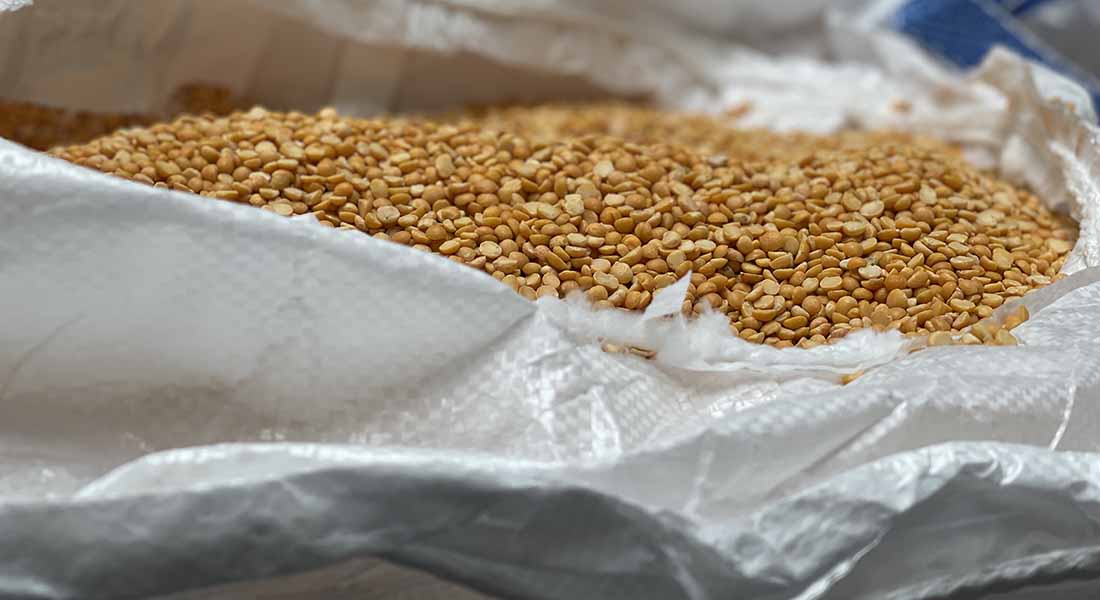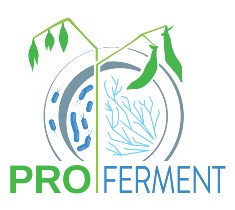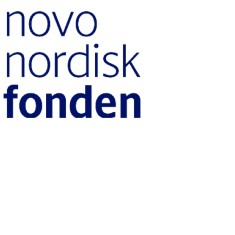PROFERMENT: Solid-state fermentations for protein transformations and palatability of plant-based foods
The vision of the PROFERMENT project is to build the scientific foundation for future development of a new category of proteinaceous, plant-based foods as clean-label alternatives for meat consumption. Using solid-state fermentation, the proteins in legumes and cereals will be nutritionally optimized and appealing structures and flavours created.

By 2050, about 50% more food is needed to feed the world. Increasing the amount of plant based foods in the diet and thereby reducing meat consumption is one way to secure sufficient food availability in the future and at the same time combat climate change. One-third of global arable land is now being used to grow feed for livestock production and the calories used by feeding the animals could theoretically feed 4 billion people more.
Solid-state fermentation, the gentle and natural method used in PROFERMENT combining Bacillus bacteria and selected types of moulds, will be explored in-depth to provide new knowledge on how to improve protein digestibility and quality of plant foods, build filamentous structures and generate desirable flavours. Yellow peas and oats are the main plant food models used, both are primarily used for animal feed and have a relatively high protein content.
PROFERMENT is divided into 4 separate, but closely linked, work packages (WPs). These are described below.
Most knowledge of fungal growth on organic material originates from bioreactor studies, but in nature, fungi grow on solid substrates. A prerequisite for effective transformation of an organic substrate such as oat or pea by a fungus is that 1) its mycelium homogeneously colonizes the substrate by hyphae that grow at their tips, while branching sub-apically and 2) that enzymes involved in the transformation are homogenously secreted within the substrate. This knowledge can be used to convert oat and pea into novel protein-rich, palatable food products.
Bacillus bacteria will also play an important role in the conversion of oat and pea in a novel protein-rich palatable food product. At the same time, it is expected to have a major impact on both fungal growth and protein secretion. It is the aim of this work package to understand this impact to be able to use it to our advantage to produce an optimal protein-rich palatable food product.
Together, colonization of the substrate and enzyme secretion in time and space will be studied in this work package in the absence and presence of bacteria.
WP leader: Professor Han Wösten, Utrecht University.
Plant food proteins are naturally embedded in complex difficult to digest matrices consisting of cellulose, hemicellulose, pectin, and lignin. We know that certain edible fungi such as Rhizopus and specific Aspergillus spp. can grow quickly on these matrices in fibrous plant materials via invasive enzymatic mechanisms, that convert the components during development of a tight mycelium that surrounds the food source (e.g. as known from soybean tempeh and brie-type cheese). Bacillus spp. may also secrete a diverse range of carbohydrate and protein active enzymes that primarily support their growth. WP2 will investigate the enzymology of these processes with the aim of understanding carbohydrate breakdown and protein transformation at the molecular level. Important investigation points include how secreted enzymes invade plant matrices and how they foster mobilization of the plant proteins and improve nutritional quality.
WP leader: Professor Anne S. Meyer, DTU Bioengineering.
A major challenge of proteinaceous plant-based foods, as new food alternatives, is to deliver high palatability to consumers. Foods derived from animal origin possess unique savoury flavours and tangible textures, which originate from muscle tissues, enzymatic processes and thermal treatment during food preparation. Fresh plants and seeds do not possess such savoury dimensions and their textures need significant modification to become attractive alternatives for consumers. This work package addresses two important aspects in solid-state fermentation (SSF) of oat and legumes with the aim to understand how to improve sensory palatability.
The first palatability aspect concerns the study of precursors in seed matrices and targeted SSFs, and how they relate to savoury taste components and thermally induced and flavours. Using a metabolomics approach, we will study how SSFs can introduce important precursors for thermal reactions. We will further study how protein quality is affected in these heated SSF systems by studying formation of Advanced Glycation Products (AGEs) and their relation to formation of key savoury flavour compounds. The WP will further address the study on the enzymatic pathways involved in the formation of small peptides (γ-glutamyl derivatives) with savoury taste enhancing and enriching properties and if they can be expressed fungal and Bacillus strains used in SSFs.
The second palatability aspect concerns the mimicking of muscle tissue by the study of structure formation in SSFs. Where both Aspergillus and Bacillus growth will facilitate the softening of seed structures, the fungi will also be investigated for their potential to form fibre-like structures with sufficient tensile strength. The three dimensional growth of the fungi will be investigated (see also WP1) and texturizing aspects will be modelled using physical parameters related to the formed network.
WP leader: Professor Wender Bredie, UCPH-FOOD.
WP4 aims to integrate the extensive knowledge generated in WP 1-3 into a detailed understanding of how Bacillus, Rhizopus and Aspergillus genetic and phenotypic information can be used to optimize protein quality, protein bioavailability, structure and palatability of oat and pea via co-fermentations. Further, WP4 addresses safety issues and generate whole-genome-sequencing (WGS) information used in all WPs.
WP4 builds on the overall idea that by rationally combining the activities of strains within Bacillus, Rhizopus and Aspergillus spp., palatable oat and pea based food structures with optimised protein quality, protein bioavailability and flavour precursor content can be designed. Furthermore, using a similar approach, the 3D-structure of oat and pea solid-state fermented food structures can be designed.
More specifically, WP4 will:
- Establish the PRO|FERMENT culture and WGS information bank providing the strains and genetic information needed to achieve the goals of WP1-WP3
- Generate detailed data on protein quality/bioavailability in oat and pea matrices as a function of fermentation
- Ensure the safety and absence of toxin formation of the utilized microbes during their use in oat and pea fermentations
- Integrated microbial performance data from WP1-WP3 enabling design of tailormade semi-solid oat and pea fermentations. These models will be validated experimentally.
WP leader: Professor Dennis Sandris Nielsen, UCPH-FOOD.
PROFERMENT has been mentioned in several media:
Schwarz, E.H. (2021). Fermenteringen er nøglen til at droppe kødet. 21.10.2021. https://kost.dk/fermenteringen-er-noeglen-til-droppe-koedet
Garde, C. (2021). Gule ærter skal erstatte det røde kød. Samvirke, 27.9.2021. https://samvirke.dk/artikler/gule-aerter-skal-erstatte-det-roede-koed
Schiønning, E. and Date, A. (2021). Kødfuldt plantekød. Podcast. Interview with Dennis Sandris Nielsen. Radio4, 4-toget, 05.08.2021. About 35 min after the start of the broadcast. https://www.radio4.dk/program/4-toget/
De Lorenzo, D. (2021). How Fermentation Can Avoid Food Waste And Create Tasty Plant-Based Products. Forbes, 31.07.2021. https://www.forbes.com/sites/danieladelorenzo/2021/07/31/how-fermentation-can-avoid-food-waste-and-create-tasty-plant-based-products/?sh=46f067b131b5
Hansen, R. (2021). Mere kødfuld end kød. Uddrag. Weekendavisen, 25.07.2021. https://www.weekendavisen.dk/2021-29/ideer/mere-koedfuld-end-koed
Larsen, S.A. (2021). Ny fødevarekategori skal skabe et reelt alternativ til kød. ScienceNews, 06.07.2021. https://www.sciencenews.dk/da/ny-foedevarekategori-skal-skabe-et-reelt-alternativ-til-koed
Brix, S. and Larsen, S.A. (2021). Fremtidens mad – og hvordan vi får forbrugerne til at købe den. Podcast: Forskningsfortællinger nr. 10. Participant: Dennis Sandris Nielsen. Spreaker, 05.07.2021. https://www.spreaker.com/user/novo_nordisk_fonden/nnf-10-fremtidens-mad. Also available at https://www.facebook.com/ucphfood and https://www.linkedin.com/company/345044/ and https://food.ku.dk/
Kloosterman, C. (2021). Hoogleraar: ‘Inzet schimmels voor vleesvervangers begrijpen’. Food+Agri business, 24.06.2021. https://www.foodagribusiness.nl/hoogleraar-inzet-schimmels-voor-vleesvervangers-begrijpen/
Redazione (2021). Proteine alternative: ricercatori danesi al lavoro per creare una nuova categoria di prodotti vegetali. Osservatorio VeganOK, 20.06.2021. https://www.osservatorioveganok.com/proteine-alternative-ricercatori-danesi-al-lavoro-per-creare-una-nuova-categoria-di-prodotti-vegetali/
Ho, S. (2021). Six-Year Research Project To Ferment ‘New Category’ Of Plant-Based Protein. Green queen, 17.06.2021. https://www.greenqueen.com.hk/research-project-ferment-new-category-plant-based-protein/
NN (2021). Major grants awarded for research on plant proteins as meat alternatives. Novo Nordisk Fonden, 17.06.2021. https://novonordiskfonden.dk/en/news/major-grants-awarded-for-research-on-plant-proteins-as-meat-alternatives/
NN (2021). 7,5 miljoen euro voor een nieuw plantaardig voedselconcept. Biojournal, 15.06.2021. https://www.biojournaal.nl/article/9330407/7-5-miljoen-euro-voor-een-nieuw-plantaardig-voedselconcept/
NN (2021). New plant-based food concept backed by 7.5 million euro grant by Utrecht University researchers. WhatisResearch, 15.06.2021. https://www.whatisresearch.com/new-plant-based-food-concept-backed-by-7-5-million-euro-grant/
NN (2021). Utrecht-Copenhagen concept for meat substitute receives 7.5 million euros. World Today News, 14.06.2021. https://www.world-today-news.com/utrecht-copenhagen-concept-for-meat-substitute-receives-7-5-million-euros/
NN (2021). Le concept Utrecht-Copenhague pour un substitut de viande reçoit 7,5 millions d’euros. Nouvelles du monde, 14.06.2021. https://www.nouvelles-du-monde.com/le-concept-utrecht-copenhague-pour-un-substitut-de-viande-recoit-75-millions-deuros/
NN (2021). El concepto Utrecht-Copenhagen para sustitutos de la carne recibe 7,5 millones de euros. NotiUlti, 14.06.2021. https://notiulti.com/el-concepto-utrecht-copenhagen-para-sustitutos-de-la-carne-recibe-75-millones-de-euros/
NN (2021). Utrechts-Kopenhaags concept voor vleesvervanger krijgt 7,5 miljoen euro. DUIC, 14.06.2021. https://www.duic.nl/algemeen/utrechts-kopenhaags-concept-voor-vleesvervanger-krijgt-75-miljoen-euro/
Tenfelde, A. (2021). Nieuw plantaardig voedselconcept gesteund door miljoenenbeurs. Universiteit Utrecht, 11.06.2021. https://www.uu.nl/nieuws/nieuw-plantaardig-voedselconcept-gesteund-door-miljoenenbeurs
Davidson, A. (2021). Fermentation is the future: How a whole new category of plant based food is being created. Innovation Origins, 10.06.2021. https://innovationorigins.com/en/this-is-how-fermentation-will-help-us-to-create-a-whole-new-category-of-plant-based-food/
Stucchi, A. (2021). Alimentos plant-based poderão ser criados de forma mais sustentável. Vegan Business, 09.06.2021. https://veganbusiness.com.br/os-alimentos-plant-based-poderao-ser-criados-de-forma-mais-sustentavel/
Redaktionen (2021). Forskere vil skabe helt ny klimavenlig plantebaseret fødevarekategori. Den Korte Avis, 09.06.2021. https://denkorteavis.dk/2021/forskere-vil-skabe-helt-ny-klimavenlig-plantebaseret-foedevarekategori/
Axworthy, N. (2021). Danish researchers raise $9 million to develop a new vegan protein that's better for the planet. VegNews, 09.06.2021. https://vegnews.com/2021/6/danish-researchers-develop-vegan-protein
CSR.dk - Forum for bæredygtig forretning (2021). Forskere vil skabe helt ny klimavenlig plantebaseret fødevarekategori. CSR.dk, 09.06.2021. https://csr.dk/forskere-vil-skabe-helt-ny-klimavenlig-plantebaseret-f%C3%B8devarekategori
Landbrugsavisen.dk (2021). Fødevareforskere får 56 mio. kr. til udvikling af en helt ny fødevarekategori. LandbrugsAvisen, 09.06.2021. https://landbrugsavisen.dk/f%C3%B8devareforskere-f%C3%A5r-56-mio-kr-til-udvikling-af-en-helt-ny-f%C3%B8devarekategori
EurekAlert (2021). Researchers want to create an entirely new category of climate-friendly plant-based foods. EurekAlert!, 07.06.2021. https://www.eurekalert.org/news-releases/685161
Dohn, M. and Steensbeck, B. (2021). Plantebaseret kost med smag, struktur og klimagevinster. Interview med Dennis Sandris Nielsen. P1 Morgen, DR, 07.06.2021.
Nyberg, J. (2021). 366 millioner sikrer luft under vingerne. Automatik & Proces, 07.06.2021. http://automatik.nu/artikel/366-millioner-sikrer-luft-under-vingerne/
Salomonsen, T. (2021). Novo-fond uddeler over 100 millioner til fødevareprojekter. FødevareWatch, 07.06.2021. https://fodevarewatch.dk/Fodevarer/article13035943.ece
-
University of Copenhagen - FOOD, Denmark
-
Utrecht University - Department of Biology, The Netherlands
In PRO|FERMENT the following persons are involved:
University of Copenhagen - FOOD
PI, Prof. Dennis S. Nielsen
PI, Prof. Wender Bredie
Prof. Lene Jespersen
Prof. Marianne Nissen Lund
Prof. Rasmus Bro
Prof. Susanne Knöchel
Assoc. Prof. Bekzod Khakimov
Assoc. Prof Frans van den Berg
Assoc. Prof. Mikael Agerlin Petersen
Assoc. Prof. Rene Lametsch
Assoc. Prof Vibeke Orlien
Utrecht University - Department of Biology
PI, Prof. Han Wösten
Prof. Marten Altelaar
Asst. Prof. Robert-Jan Bleichrodt
Asst. Prof. Robin A. Ohm
Technical University of Denmark Bioengineering
PI, Prof. Anne S. Meyer
Prof. Alexander Büll
Prof. Bernard Henrissat
Prof. Jens Chr. Frisvad
Senior researcher Jesper Holck
Postdoc Kristian Barrett
Postdoc Cameron Hunt
Asst. Prof. Jane W. Agger
All available positions in PRO|FERMENT will be advertised on the homepages of the relevant universities:

Period: 1 January 2022 - 31 December 2027


